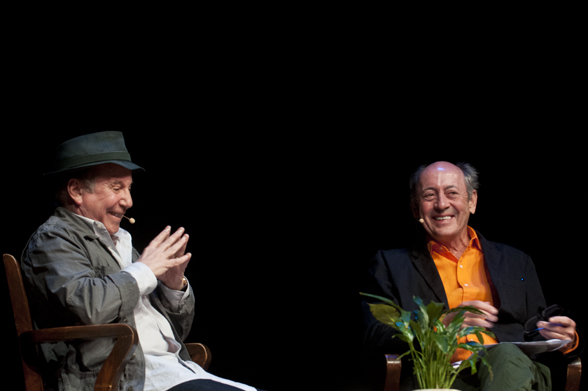Image may be NSFW.
Clik here to view.
Clik here to view.

Katie McLean | Staff Photographer
Singer-songwriter Paul Simon and poet Billy Collins discuss the difference between song lyrics and poems during Friday’s evening conversation in the Amphitheater.Alan: This is not the first time Paul Simon and Billy Collins have shared a stage. The two men are friends and have participated in such convivial encounters several times in the past. Soon they will bring their "road show" to Emory University. If you ever have opportunity to see these guys join forces, don't miss it! Their Chautauqua presentation was the most deeply satisfying "concert" I have ever attended. To judge by the buoyant, ebullient spirit of the exiting attendees, I would not be surprised if "everyone" felt the same.
In conversation with Collins, Simon reveals stories behind famous songs
By Leah Harrison | Guest writerChautauqua-centric entertainment reached a new peak Friday night when poet and perennial favorite Billy Collins compared his creative process with songwriter Paul Simon. The two discussed the qualities an opening line should have, their sources of inspiration and told the stories behind several well-known songs and poems, all with a heavy dose of charm and humor.
Collins and Simon first held a similar conversation several years ago at the 92nd Street Y after meeting at a fundraising event; this is their third performance, and they’re slated for a fourth in the fall.
The conversation began with an antidote to distasteful namedropping. If you find yourself interacting with someone who tries to impress you with their famed acquaintances, Simon suggested that you reply, “Oh, I used to played bridge with his mother.”
Simon, a newcomer to the Amp, was the primary focus of the evening. He explained that he saw himself as a songwriter more than a singer; that music always comes before the lyrics; and pointed to duos like Robert and Johnny and The Everly Brothers as inspiration for harmonizing and blending.
With guitar in hand, Simon demonstrated various methods he uses to come up with a melody, illustrating with his recent song, “Love and Hard Times.”
Collins asked Simon why confusing or contradictory lyrics — like “Rock the boat, don’t rock the boat, baby” — work in songs, but not poetry. The musician felt that sounds adhere to words, and sometimes that’s enough. The relationship between music and lyrics can allow a suspension of logic.
In the question-and-answer portion of the evening, Simon was asked to give the backstory for “You Can Call Me Al.” As it turns out, Pierre Boulez, freshly appointed as music director of the New York Philharmonic, stopped by Simon’s house party with a mutual friend in the early 1970s, and upon leaving, thanked Al and Betty — Paul and his then wife, Peggy Harper — for the evening.
Also during the Q-and-A, Simon spoke about his respect for Elvis Presley and how a blatant reference to the rockabilly music star ended up on an album featuring South African music.
To cap the event, Collins read several poems, including “Another Reason I Don’t Keep a Gun in the House,” “The Lanyard” and “Cheerios,” in which Collins deprecates old age, a theme of the evening.
Simon performed some of his biggest hits, including “The Sound of Silence,” “Slip Slidin’ Away,” “Me and Julio Down by the Schoolyard” and “The Boxer,” each altered for a one-man performance. These renditions were more than repeats of famous recordings, making clear that the musical genius that made Simon famous for nearly 50 years is alive and well.
Alan:
"Another Reason I Don't Keep A Gun In The House" by Billy Collins: http://www.poemhunter.com/poem/another-reason-why-i-don-t-keep-a-gun-in-the-hou/
"The Lanyard" by Billy Collins: http://paxonbothhouses.blogspot.com/2013/08/the-lanyard-us-poet-laureate-billy.html
Billy Collins' TED Talk: http://www.ted.com/talks/billy_collins_everyday_moments_caught_in_time.html
A sampling of Billy Collins' poems can be found at http://www.poemhunter.com/billy-collins/
Chautauqua Institution (a national treasure): http://en.wikipedia.org/wiki/Chautauqua_Institution